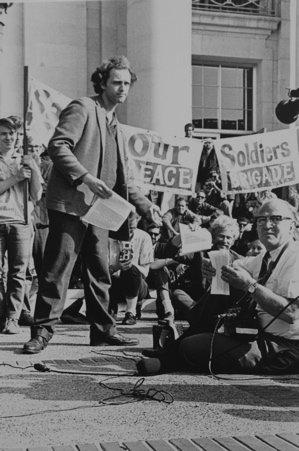What it means to be a college student with free speech
As the editor-in-chief of the Old Gold & Black, I often find myself reflecting on the history of journalism and free speech. And as a college student living in an age where the list of protestables is miles long, I am reminded of the victories of students before us in pursuit of the freedom of speech.
A fear of communism, the ideological boogeyman of the 50’s and 60’s, rampantly spread across the nation during the era of Senator Joseph McCarthy. Colleges and universities certainly weren’t exempt from this fear; in fact, many schools actually began to regulate their students’ expressions of political speech in order to halt the perceived threat of a communist Russian influence on the minds of vulnerable young students in higher education.
Despite the creation of a multitude of student groups, and the practice of nonviolent forms of protests such as sit-ins, students had to endure sanctions from the college’s administration as well as face penalties from the police if they continued to violate the school’s policy against political activities near campus. Only through the sympathy of more liberal faculty had they been able to operate prior to the administrative crackdown on their actions.
Thankfully, college students at the University of California, Berkeley, were willing to take risks and speak out against their school’s limitations to free speech. Through the school’s Free Speech Movement (FSM) led by Marco Savio in 1964, more than 3000 students asserted their legal right to the First Amendment, and the group’s demands were eventually met.
While much has changed since the Free Speech Movement began, the relationship between fear and freedom has remained. Threatened by a looming cloud of war and a loss of freedom, the nation’s fear became the driving force in politics and society. Sounds familiar, right?
Even with the reality of a deadly pandemic, students gathered on Wofford’s campus on Oct. 1, 2020, to protest racism on our campus. Following a summer of political unrest, where nationwide protests against police brutality and racial injustice as a whole were demonized because of a fear of change, it only makes sense that college students, who have a rich history of stubbornness and moxie, would be the ones to continue using their voices after the nation was slowly starting quiet down.
Perhaps one of the most valuable lessons that 2020 taught us was the power of our speech. While the world was shut indoors, we all collectively relied on social media and news sites for a vicarious sense of certainty as to what the future held. But this period of screen-filtered speech is coming to an end. There’s a light at the end of the tunnel, and it’s lit with students like us.





























